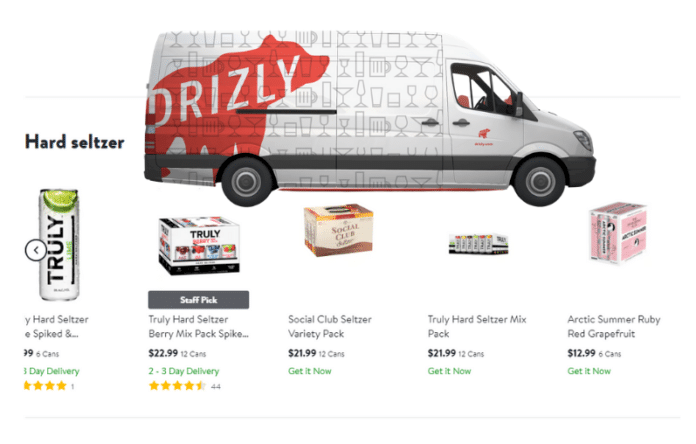In the midst of a once-in-a-century pandemic, delivery services are one of the few industries experiencing significant growth. During stay-at-home and shelter-in-place orders, a novel experience for most of us, many people relied on companies like Instacart, Postmates, and Shipt to deliver groceries and other vital supplies – including alcohol.
As liquor stores have officially been declared “essential businesses” by the government, an impressive feat considering prohibition was more recent than the last global pandemic, alcohol delivery service Drizly is thriving – and it’s bringing hard seltzer along for the ride. Launched in 2013, Drizly is the “leading ecommerce [alcoholic beverage] marketplace,” according to their website.
“Drizly partners with retailers in 1,350 cities to offer consumers of legal drinking age unrivaled selection and a transparent, personalized shopping experience… Drizly partners with retailers to bring their shelves online, helping them to reach new customers, tap into key market and customer insights, and diversify their business to grow sales,” the company said.
As hard seltzer is a popular at-home (or “off-site”) beverage, Drizly has been instrumental in its phenomenal growth by bringing it safely into consumers’ homes. Often referred to as the “Amazon for liquor,” it offers a safe way for customers to experiment with hard seltzer brands and flavors, particularly among demographics not known for risk-taking.
During local lockdowns Drizly sales were up 400 percent in May. While that’s an impressive growth rate, CEO Cory Rellas admits that profiting from the pandemic is a distinctly mixed bag. “We try to approach that with humility because there are such difficult times ongoing today,” said Rellas.
Yet as a result of this boon, Drizly is able to create jobs during a time of widespread economic downturn. The company plans to hire an additional 70 employees this year, a significant expansion of their current roster of 200. Drizly also partners with over 2,600 local retailers, which helps the area businesses which ultimately fulfill the orders.
While much of May’s 400 percent growth can likely be attributed to the quarantine, Rellas is still optimistic about the company’s future. “You had a lot of folks who have had good experiences with other categories shopping online, who now experience alcohol and are very easy adopters,” said the CEO.
In other words, he thinks people will appreciate the convenience of home alcohol delivery and will stick around even as more businesses start to open up. Drizly’s website boasts that most deliveries are made in 60 minutes or less.
It also offers consumers expanded options as they can easily browse the selection of several stores at once. This feature is particularly exciting for hard seltzer enthusiasts as new brands continue to enter the market regularly. With such expanded options, it’s easier for consumers to access smaller craft brands which may have limited distribution.
As so many of us are still staying close to home and limiting our trips out, Drizly will continue making this unprecedented pandemic a little bit easier. With hard seltzer options continuing to expand regularly, the delivery service makes it easier for consumers to connect with their new favorite brands.
- Molson Coors Increases NA Foothold with La Colombe Coffee - September 15, 2021
- Half Time Beverage Adds Seltzer and Canned Cocktails Gift Packs - September 14, 2021
- Coming Soon: Great Lakes Agave Twist Ranch Water - September 13, 2021














